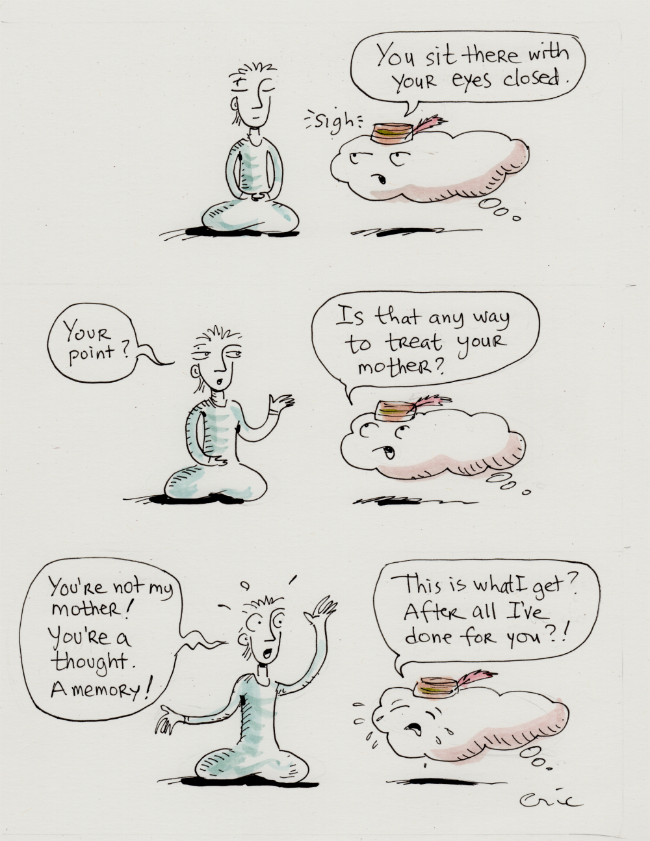My mother Roslyn and my Aunt Sena had a falling out in 1968.
Decades of unexpressed emotion came to a head over a small dinner table event. They stopped speaking. For decades each would bristle at the mention of the other’s name.
They never reconciled.
My mother died in 2006; Sena followed in 2012.
As Aunt Sena’s dementia deepened in her final years, I noticed something curious. When I mentioned my mother’s name, Sena would bristle and scowl.
“You’re mad?” I’d ask.
She would nod.
“About what?” I’d ask, and she’d stare blankly. She didn’t know.
She couldn’t remember what had happened.
While the details of the events had faded, the emotional momentum continued. The anger was there, though she didn’t know why. That’s how the brain and family karma work.
Powerful patterns of emotional reactivity are encoded deep in the brain.
These patterns of emotional reactivity are stored in what neuroscientists call implicit memory. These deep memory patterns are developed, primarily, in the earliest years of your life.
They are encoded as non-verbal, pre-logical, emotional information in the amygdala and other neural structures. From these primal neural base camps, the patterns of emotional reactivity infiltrate your daily life.
You don’t have to remember these memories for them to be active. They operate on their own, without your conscious intent.
When implicit memory is triggered, it arises as pure emotional reaction, not as a specific memory of a past event.
It arises content-free, flooding the mind with emotion and the body with sensations. What triggers the implicit memory?
Implicit memories are triggered by approximations and associations.
You don’t have to be talking to your mother in order to trigger the emotional patterns, the implicit memories of “mother” karma.
Any condition that approximates the emotional atmosphere of “mothering” can trigger a flood of implicit, emotionally reactive memories.
This triggering process isn’t reserved to mother. It’s the same for all implicit memories, whether those are associated with father, brother, sister, uncle, teacher, or any other person/object/situation.
Whenever the emotional atmosphere, context, or condition approximates the original situation, the trigger is pulled.
It could be a facial expression or a tone of voice. It could be a particular word, a fragrance. Anything that approximates or symbolically associates with the original trauma, situation, relationship.
And what happens then?
Once triggered, the implicit memory floods in. It colors your perceptions, shapes your behavior, and governs your experience. The conscious mind, awash in a churning sea of implicit memories, loses it’s capacity to assess the situation, discern wise actions, make healthy choices. All that’s left is reactivity. Well, not really all.
This is where the teachings of the wisdom traditions are so valuable. The wisdom traditions all point to a level of memory that is deeper and more primary than even implicit memory.
It is the inherent memory of the Spirit, the remembrance of your Unconditioned, Essential Identity. You discover this inherent memory through meditative awareness. Inherent memory, or the remembrance of Presence, opens the door to healing.
While the patterns of reactivity are deeply encoded in the brain, they are not out of reach.
You can reach into the fundamental neurological patterns, into the implicit memories with the power of meditative presence.
You can transform the emotional limitations of implicit memory through meditative awareness. As you develop your capacity to rest more and more fully in Presence, to embody the peace that passeth all understanding, you no longer turn away from the wounds of the past. Instead, you turn towards those wounds.
You become the healer of the past.
You infuse the radiance of loving awareness into the depths of your neurology and memory.
This is where science is confirming what the sages of the wisdom traditions have long declared: you can transform the deepest patterns of reactivity.
You can re-pattern your neurology.
You can redeem the family karma of the past and live with freedom. You can incline your brain in the direction of wisdom, compassion, and creativity. You can liberate yourself from the reactivity of implicit memories—karmic proclivities—that were encoded and reinforced in your earliest years . . . through specific meditative practices.
What implicit memories are you holding on to?
Love elephant and want to go steady?
Sign up for our (curated) daily and weekly newsletters!
Editor: Renée Picard
Illustration by Eric Klein







Read 1 comment and reply